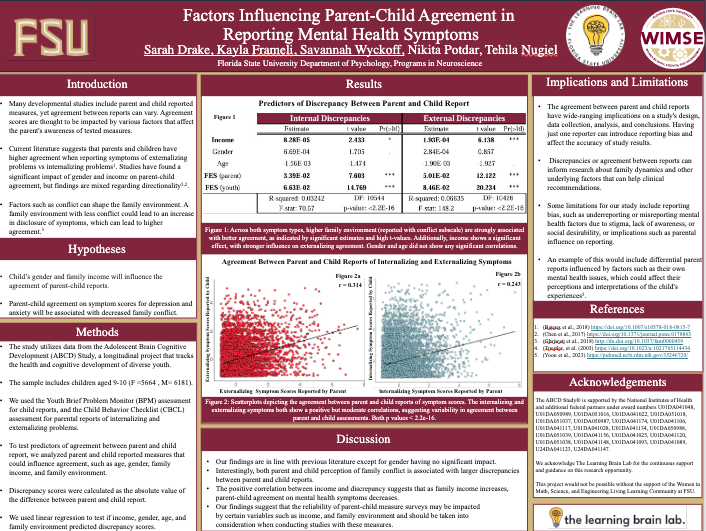Research Symposium
25th annual Undergraduate Research Symposium, April 1, 2025
Sarah Drake Poster Session 1: 9:30 am - 10:30 am / Poster #271

BIO
I'm a senior studying Psychology, Chemistry, and Biology here at Florida State University. I was born and raised in Tallahassee, FL and have a passion for Neuroscience. I am interested in researching sleep in adolescents and how that is attributed to sleep disorders such as Insomnia. My hobbies outside of academics include teaching ballet, traveling, and learning about new cultures. After receiving my bachelor's degree, I hope to continue research while obtaining my Ph.D.
Factors Influencing Parent-Child Agreement in Reporting Mental Health Symptoms
Authors: Sarah Drake, Tehila Nugiel, Ph.D.Student Major: Psychology, Chemistry, Biology
Mentor: Tehila Nugiel, Ph.D.
Mentor's Department: Department of Psychology Mentor's College: College of Arts and Sciences Co-Presenters: Savannah Wyckoff, Kayla Framelli
Abstract
Many developmental studies use parent and child reported measures, yet correspondence between reports can vary. Measures of anxiety, depression, and suicidality tend to be more difficult for parents to report accurately, as internalizing symptoms are not easily observable. The purpose of this investigation is to evaluate the agreement between parent and child reports using the KSADS (Kiddie Schedule for Affective Disorders and Schizophrenia) measures of depression, anxiety, and suicidality. This study will examine how factors such as the child’s gender, family income, as well as family conflict (measured by the Family Environment Scale) and parental monitoring, influence the agreement between parent and child reports. Both family conflict and parental monitoring will be assessed using parent self-report. Our research utilizes data from the Adolescent Brain Cognitive Development (ABCD) Study, a longitudinal project examining the health and cognitive development of over 11,000 socio-demographically diverse youth. To assess agreement between parent and child reports, we will correlate the two, and a difference score will be calculated to measure discrepancies. We hypothesize that child gender and family income will influence the agreement of parent-child reports, based on prior literature which reveals mixed findings regarding their impact on the degree of agreement. We also hypothesize that parent-child agreement on symptoms will be associated with decreased family conflict and will show no association with the levels of parental monitoring. By identifying patterns in parent-child agreement, we can inform future research on factors that influence reporting accuracy, leading to more reliable mental health assessments for youth.
Keywords: ABCD, Anxiety, Depression, Youth

